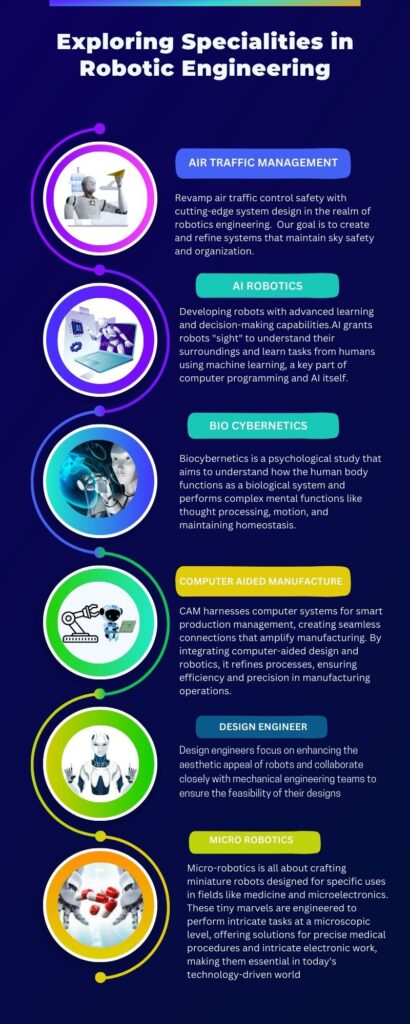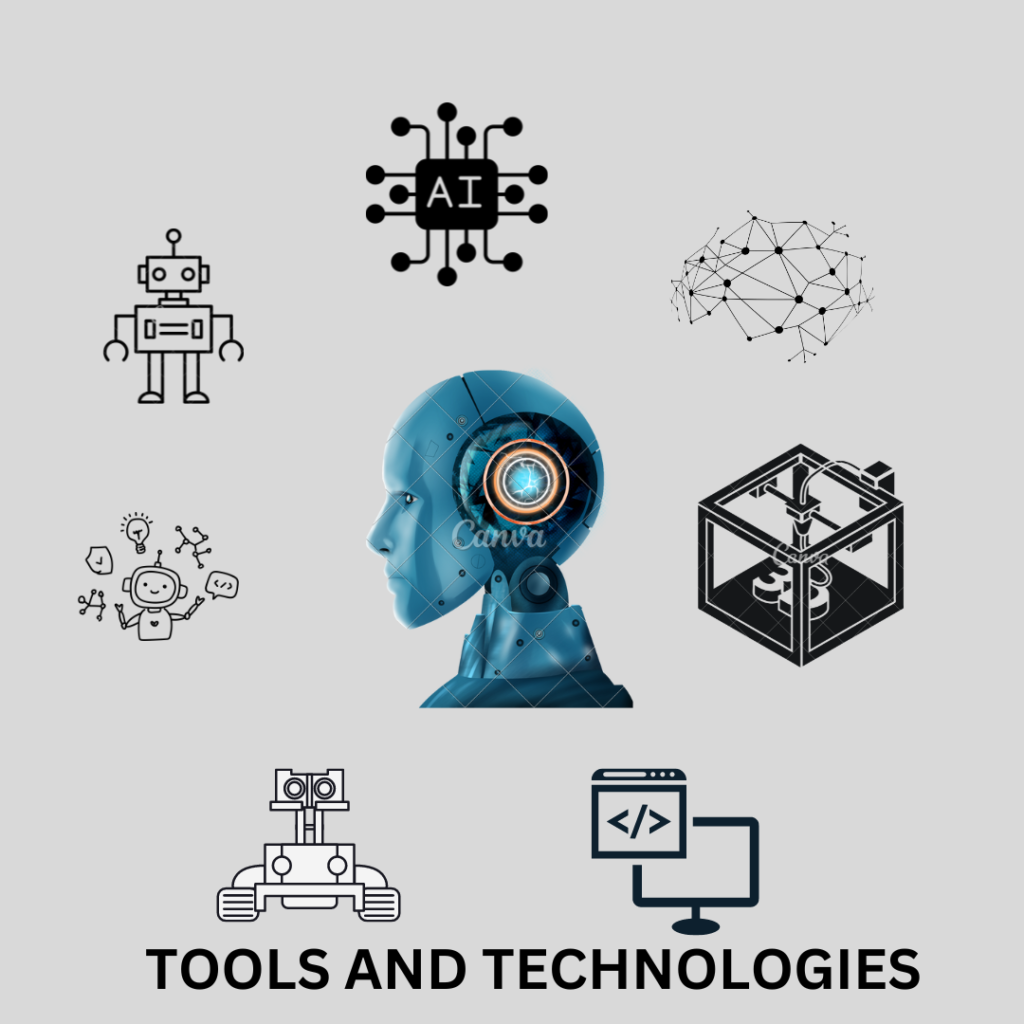Introduction
Robotics engineering is a rapidly growing field with a high demand for qualified professionals. Robotics engineers design, build, and program robots to perform various tasks, from manufacturing and healthcare to defense and entertainment. The field is expected to grow even more in the coming years, as robots become increasingly sophisticated and capable.
If you’re interested in a career in robotics engineering, now is the time to start planning. The field requires a strong foundation in math, science, and engineering, as well as experience with programming and electronics. There are many different ways to get started in robotics engineering, such as taking high school or college classes, participating in robotics clubs or organizations, or working on internships or research projects.
With hard work and dedication, you can achieve your dream of becoming a robotics engineer. Robotics is a challenging but rewarding field, and the demand for qualified professionals will only grow in the years to come.
- Building a strong foundation for Robotics Engineering
- Specialities in Robotic Engineering Field
- Robotics clubs in India
- A Typical Day in the Life of a Robotics Engineering Student
- Cutting-Edge Tools and Technologies in Robotics Engineering
- Robotics Engineering in India: Current Trends and Future Prospects
- Navigating Your Career in Robotics Engineering
- Conclusion
- Frequently Asked Questions
Building a strong foundation for Robotics Engineering
Building a strong foundation is essential for any career in Robotics Engineering. This means having a strong understanding of math, science, and engineering principles. It also means being proficient in programming and electronics.
One of the best ways to build a strong foundation in Robotics Engineering is to take classes in high school or college. There are many different courses that can help you develop the skills you need, such as calculus, physics, chemistry, computer science, and engineering. You can also get involved in robotics clubs or organizations to gain hands-on experience.
In addition to formal education, it’s also important to stay up to date on the latest trends in robotics. This can be done by reading robotics magazines and websites, attending robotics conferences, and networking with other robotics professionals.
By building a strong foundation in Robotics Engineering, you will be well-positioned for a successful career in this exciting field. Robotics is a rapidly growing field with a high demand for qualified professionals. With the right skills and experience, you can make a real difference in the world through robotics engineering.
Tips for students in India who are looking to pursue a career in Robotics Engineering:
- Take math, science, and engineering classes in high school. This will give you the foundation you need to succeed in college and beyond.
- Get involved in robotics clubs or organizations. This is a great way to learn more about robotics and meet other people who are interested in the field.
- Do internships or research projects in robotics. This will give you hands-on experience and help you build your resume.
- Stay up-to-date on the latest trends in robotics. The field is constantly evolving, so it’s important to stay ahead of the curve.
- Network with people in the robotics industry. This will help you learn about job opportunities and make connections that could help you land your dream job.
With hard work and dedication, you can achieve your dream of becoming a robotics engineer. Robotics is a rapidly growing field with a high demand for qualified professionals. With the right skills and experience, you can make a real difference in the world through Robotics Engineering.

Specialities in Robotic Engineering Field
Robotics clubs in India

Robocon India: It is a national-level robotics competition organized by the All India Council for Technical Education (AICTE). The competition is open to students from all over India, and it is a great way to showcase your skills and compete with the best in the country.
FIRST India: FIRST is a global robotics organization that aims to inspire young people to be science and technology leaders. FIRST India has a number of robotics clubs all over the country, and they offer a variety of programs for students of all ages.
RoboVITics: RoboVITics is a robotics club at VIT University in Vellore, Tamil Nadu. It is one of the most active robotics clubs in India, and it has won numerous awards at national and international competitions.
Botlabz: Botlabz is a robotics education company that offers a variety of robotics courses for students of all ages. They also have a number of robotics clubs all over India, where students can learn about robotics and build their own robots.
Autonomous Robotics Club (ARC): ARC is a robotics club at IIT Bombay. It is one of the oldest and most respected robotics clubs in India, and it has produced some of the brightest minds in the field of robotics.
These are just a few of the many great robotics clubs in India. If you are interested in robotics, I encourage you to find a club near you and get involved. It is a great way to learn new skills, meet new people, and have fun.
A Typical Day in the Life of a Robotics Engineering Student
The day in the life of a robotics engineering student can vary depending on the specific program and the student’s interests. However, here is a general overview of what a typical day might look like:
- Morning: Students may start their day with a lecture on a topic related to robotics, such as mechanical design, electrical engineering, or computer science. They may also have lab work, where they will have the opportunity to apply the concepts they learned in lectures to real-world projects.
- Afternoon: Students may have more lectures or lab work. They may also have time to work on individual or group projects. Robotics engineering students often have to work on projects that require them to design, build, and program robots.
- Evening: Students may have time to study for exams, meet with their advisor, or participate in extracurricular activities. They may also have time to relax and unwind.
In addition to the academic requirements, robotics engineering students also have to put in a lot of time outside of class to learn new skills and stay up to date on the latest trends in robotics. They may do this by reading robotics magazines and websites, attending robotics conferences, or taking online courses.
Here are some of the specific tasks that a robotics engineering student might do on a daily basis:
- Designing Robots: Robotics engineers need to be able to design robots that can perform a variety of tasks. This requires them to have a strong understanding of mechanical engineering, electrical engineering, and computer science.
- Building Robots: Once a robot has been designed, it needs to be built. Robotics engineers need to be able to use a variety of tools and materials to build robots that are both functional and reliable.
- Programming Robots: Robots need to be programmed to perform the tasks they are designed to do. Robotics engineers need to be able to write code that is efficient and effective.
- Testing Robots: Once a robot has been built and programmed, it needs to be tested to make sure it works properly. Robotics engineers need to be able to identify and fix any problems with the robot.
- Working with other Engineers: Robotics engineers often work with other engineers, such as mechanical engineers, electrical engineers, and computer engineers. They need to be able to communicate effectively and work collaboratively to achieve common goals.
If you are interested in a career in robotics engineering, it is important to be prepared for the challenges and rewards of this field. Robotics engineering is a challenging but rewarding career, and it is important to love what you do.
Cutting-Edge Tools and Technologies in Robotics Engineering

CAD software: CAD software is used to create 3D models of robots. Some popular CAD software programs for robotics include SolidWorks, Autodesk Inventor, and CATIA.
Programming languages: Robotics engineers need to be proficient in programming languages such as Python, C++, and Java. These languages are used to program robots to perform specific tasks.
Robotics simulation software: Robotics simulation software is used to test robots in a virtual environment before they are built. This helps to ensure that the robots will work properly before they are deployed in the real world. Some popular robotics simulation software programs include V-REP, Webots, and Gazebo.
Robotics Hardware: Robotics engineers need to be familiar with a variety of robotics hardware, such as motors, sensors, and actuators. These components are used to build robots that can perform a variety of tasks.
Machine learning: Machine learning is a rapidly growing field that is having a major impact on robotics. Robotics engineers need to be familiar with machine learning algorithms and how they can be used to make robots more intelligent and autonomous.
Artificial intelligence: Artificial intelligence is another rapidly growing field that is having a major impact on robotics. Robotics engineers need to be familiar with AI algorithms and how they can be used to make robots more intelligent and autonomous.
In addition to these specific tools and technologies, robotics engineers also need to have a strong foundation in math, science, and engineering. They need to be able to understand the principles of physics, mechanics, and electrical engineering in order to design and build robots.
If you are interested in a career in robotics engineering, it is important to start learning these tools and technologies as early as possible. There are many resources available online and in libraries that can help you learn about robotics. You can also get involved in robotics clubs or organizations to gain hands-on experience.
The field of robotics is constantly evolving, so it is important to stay up to date on the latest trends. Read robotics magazines and websites, attend robotics conferences, and take online courses. By staying ahead of the curve, you will be well-positioned for a successful career in robotics engineering.
Here are some certification courses to do to become a Robotic Engineer https://www.careers360.com/courses-certifications/robotics-engineering-certificate-courses
Robotics Engineering in India: Current Trends and Future Prospects
The robotics engineering industry in India is growing rapidly, with a projected compound annual growth rate (CAGR) of 19.2% from 2022 to 2027. This growth is being driven by a number of factors, including:
- The increasing adoption of robotics in a variety of industries, such as manufacturing, healthcare, and logistics.
- The development of new robotics technologies, such as artificial intelligence (AI) and machine learning.
- The availability of skilled robotics engineers in India.
Some of the key industry trends in robotics engineering in India include:
- The increasing use of robotics in manufacturing: Robotics is being increasingly used in manufacturing to automate tasks that are dangerous, repetitive, or tedious. This is leading to increased productivity and efficiency in the manufacturing sector.
- The growth of the healthcare robotics market: Robotics is being used in healthcare to perform a variety of tasks, such as surgery, rehabilitation, and drug delivery. This is leading to improved patient care and outcomes.
- The development of autonomous robots: Autonomous robots are robots that can operate without human input. This is a rapidly growing area of robotics, with potential applications in a variety of industries.
- The use of robotics in space exploration: Robots are being used to explore space, including the Moon and Mars. This is helping us to learn more about our solar system and to prepare for future human exploration.
The growth of the robotics engineering industry in India is creating a number of job opportunities for robotics engineers. Robotics engineers can find jobs in a variety of industries, including manufacturing, healthcare, logistics, and space exploration.
If you are interested in a career in robotics engineering, India is a great place to start. The industry is growing rapidly, there are many job opportunities available, and the salaries are competitive. You can get started by learning about robotics, getting involved in robotics clubs or organizations, and earning a degree in robotics engineering.
Navigating Your Career in Robotics Engineering
The career progression for a robotics engineer can vary depending on the organization and the engineer’s skills and experience. However, the progression typically follows a path from entry-level to more senior roles with increasing responsibility.

Here are some of the skills and experience that can help an engineer advance in their career in Robotics:
- Strong Technical skills: Robotics engineers need to have a strong foundation in math, science, and engineering. They also need to be proficient in programming languages and robotics software.
- Problem-solving skills: Robotics engineers need to be able to identify and solve complex problems. They also need to be able to think creatively and come up with innovative solutions.
- Communication skills: Robotics engineers need to be able to communicate effectively with other engineers, scientists, and technicians. They also need to be able to communicate with non-technical stakeholders.
- Leadership skills: Robotics engineers who want to advance to senior roles will need to develop leadership skills. They will need to be able to lead teams, motivate others, and make decisions under pressure.
Robotics Engineer: Robotics engineers are responsible for designing, building, and programming robots. They work with other engineers, scientists, and technicians to develop robotic systems that can perform a variety of tasks.
Senior Robotics Engineer: Senior robotics engineers have more experience and responsibility than robotics engineers. They may lead teams of engineers, manage projects, or develop new technologies.
Robotics Manager: Robotics managers oversee the work of robotics engineers and technicians. They are responsible for ensuring that projects are completed on time and within budget.
Director of Robotics: Directors of robotics are responsible for the overall robotics division of an organization. They set the vision for the division, develop strategies, and manage budgets.
If you are interested in other career fields check out this website https://futurereadytools.com/category/careers/
Conclusion
The career progression for a robotics engineer can vary depending on the organization and the engineer’s skills and experience. However, the progression typically follows a path from entry-level to more senior roles with increasing responsibility.
If you are interested in a career in robotics engineering, it is important to start developing the skills and experience that will help you advance in your career. You can do this by getting involved in robotics clubs or organizations, earning a degree in robotics engineering, and taking on leadership roles in projects.
The future of robotics is bright, and there are many exciting opportunities for Robotics Engineers. If you are passionate about technology and innovation, a career in robotics engineering could be the perfect fit for you.
Frequently Asked Questions
- What is Robotics Engineering?
A. Robotics engineering is the field of engineering that deals with the design, construction, operation, and application of robots. Robotics engineers use their knowledge of mathematics, physics, computer science, and engineering to create robots that can perform a variety of tasks.
2. What are the skills required for a career in Robotics Engineering?
A. The skills required for a career in robotics engineering vary depending on the specific job role, but some of the most important skills include:
- Strong technical skills in mathematics, physics, computer science, and engineering
- Problem-solving skills
- Creativity and innovation
- Communication skills
- Leadership skills
3. What is the education required for a career in Robotics Engineering?
A. A bachelor’s degree in robotics engineering is typically required for entry-level jobs in robotics engineering. However, some employers may also require a master’s degree or Ph.D. in robotics engineering, especially for more senior roles.
4. What are the job prospects for Robotics Engineers?
A. The job prospects for robotics engineers are excellent. The demand for robotics engineers is expected to grow significantly in the coming years, as robots are increasingly used in a variety of industries, such as manufacturing, healthcare, and logistics.
5. What is the average salary for Robotics Engineers?
A. The salary range can vary depending on the engineer’s experience, skills, and location.
6. What are the benefits of a career in Robotics Engineering?
A. Some of the benefits of a career in robotics engineering include:
- The opportunity to work on cutting-edge technology
- The chance to make a real impact on the world
- The ability to work with other talented engineers and scientists
- The potential for high salaries
7. What are the challenges of a career in Robotics Engineering?
A. Some of the challenges of a career in Robotics Engineering include:
- The field is constantly evolving, so engineers need to be constantly learning new things
- The work can be demanding and stressful.
- The job market can be competitive.
8. What is the future of Robotics Engineering?
A. The future of robotics engineering is bright. Robots are increasingly being used in a variety of industries, and the demand for robotics engineers is expected to grow significantly in the coming years. Robotics engineers will be in high demand to develop new robots and technologies that can improve our lives.
9. How can I get started in a career in Robotics Engineering?
A. There are a few things you can do to get started in a career in Robotics Engineering:
- Take robotics classes in high school or college
- Get involved in robotics clubs or organizations
- Earn a degree in robotics engineering
- Take on leadership roles in robotics projects
- Network with other robotics engineers
10. What are some of the most popular Robotics Engineering jobs?
A. Some of the most popular robotics engineering jobs include:
- Robotics engineer
- Senior robotics engineer
- Robotics manager
- Director of robotics
- Robotics scientist
- Robotics researcher





